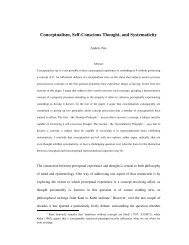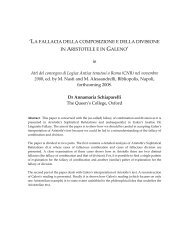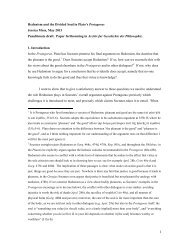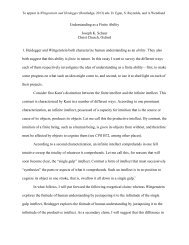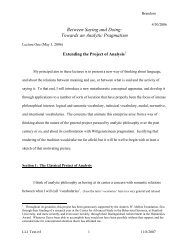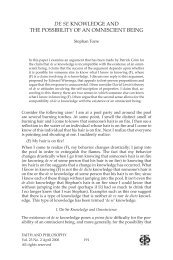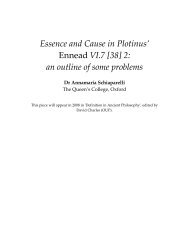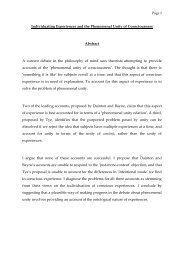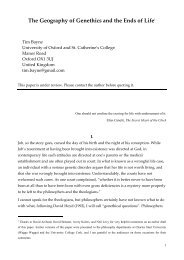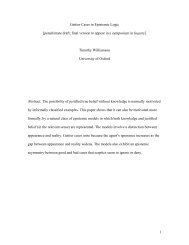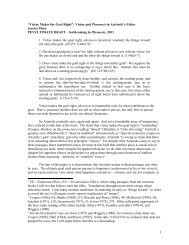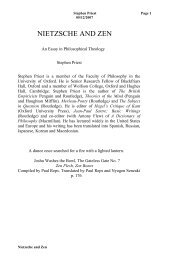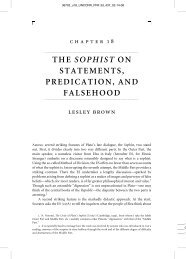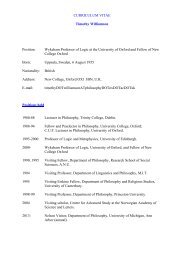What Aristotle can teach us about personality disorder - University of ...
What Aristotle can teach us about personality disorder - University of ...
What Aristotle can teach us about personality disorder - University of ...
Create successful ePaper yourself
Turn your PDF publications into a flip-book with our unique Google optimized e-Paper software.
expressions <strong>of</strong> love and positive reinforcement, but rather with psychosocial adversity, including<br />
childhood physical, sexual and emotional ab<strong>us</strong>e or neglect, parental psychopathology, family<br />
breakdown, institutional care, war, poverty, and migration.<br />
This is why <strong>Aristotle</strong> would agree with the psychotherapeutic idea that the character traits<br />
associated with <strong>personality</strong> <strong>disorder</strong> are relics from the past. They have been learned in adverse<br />
circumstances. People with <strong>personality</strong> <strong>disorder</strong> have not had the sort <strong>of</strong> past that we all need to be<br />
able to find the mean between extremes. They need to be given the opportunity to develop this<br />
capacity – to learn to find the balance.<br />
Character development is a continuo<strong>us</strong> process. It does not come to a sudden end with adulthood.<br />
Long-standing patterns and habits <strong>can</strong> be unlearned, and new ways <strong>of</strong> thinking, feeling, and acting<br />
slowly put in their place. People <strong>can</strong> change.<br />
This is what effective treatment for <strong>personality</strong> <strong>disorder</strong> m<strong>us</strong>t aim to achieve. If <strong>Aristotle</strong> is right,<br />
people with <strong>personality</strong> <strong>disorder</strong> need to be given the opportunity to re-shape their <strong>personality</strong> by<br />
developing the capacity for virtue. But they need stability, support, care, and positive reinforcement<br />
to help them do so. The capacity to find the mean between extremes depends on the opportunity to<br />
find pleasure in doing things for your own good and the good <strong>of</strong> others. Perhaps too, it depends on<br />
recognizing that it is within your power to make your life your own.<br />
Psychotherapy <strong>of</strong> vario<strong>us</strong> bents, sometimes in conjunction with medication, is now recognized as an<br />
effective treatment for <strong>personality</strong> <strong>disorder</strong>. It is sometimes thought that such therapy needs to be<br />
painful and hard to be effective. Perhaps the final lesson to be learned from <strong>Aristotle</strong> is that this may<br />
not be right. It may be pleasure that motivates and cements the process <strong>of</strong> learning and change.<br />
Maybe therapy, like childhood, should contain as much pleasure as possible.<br />
¹Dr Hanna Pickard<br />
Wellcome Tr<strong>us</strong>t Biomedical Ethics Clinical Research Fellow<br />
Oxford Centre for Neuroethics, Department <strong>of</strong> Philosophy<br />
and All Souls College<br />
<strong>University</strong> <strong>of</strong> Oxford<br />
Complex Needs Service, Oxford Health NHS Foundation Tr<strong>us</strong>t<br />
6



